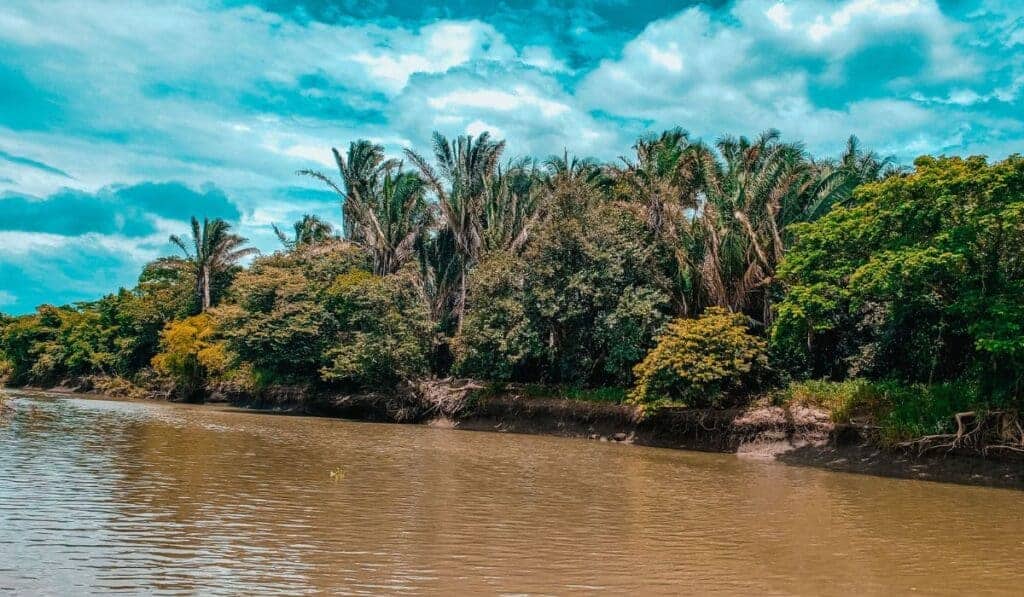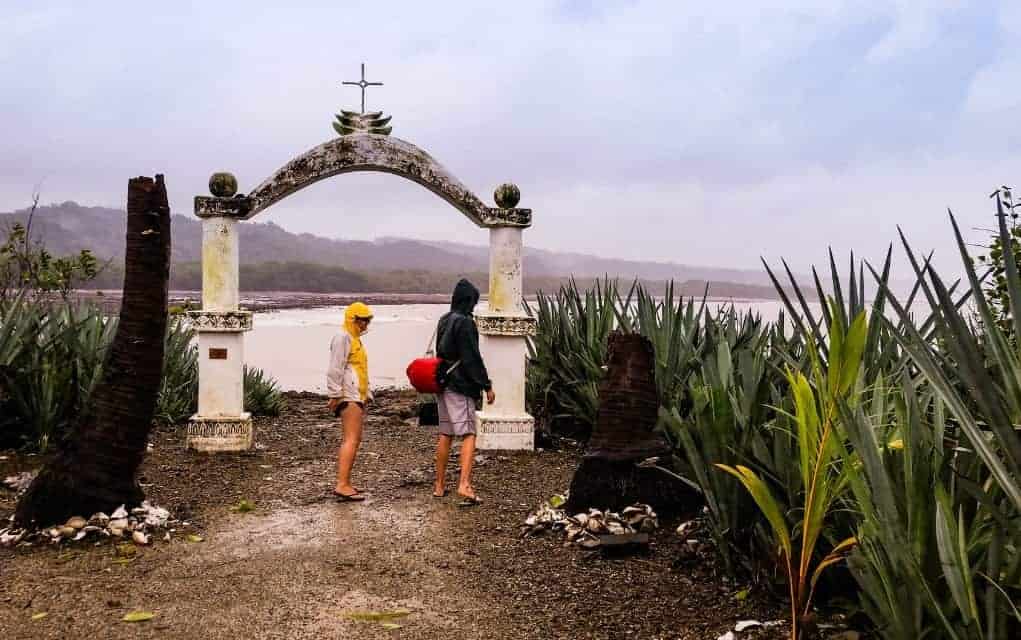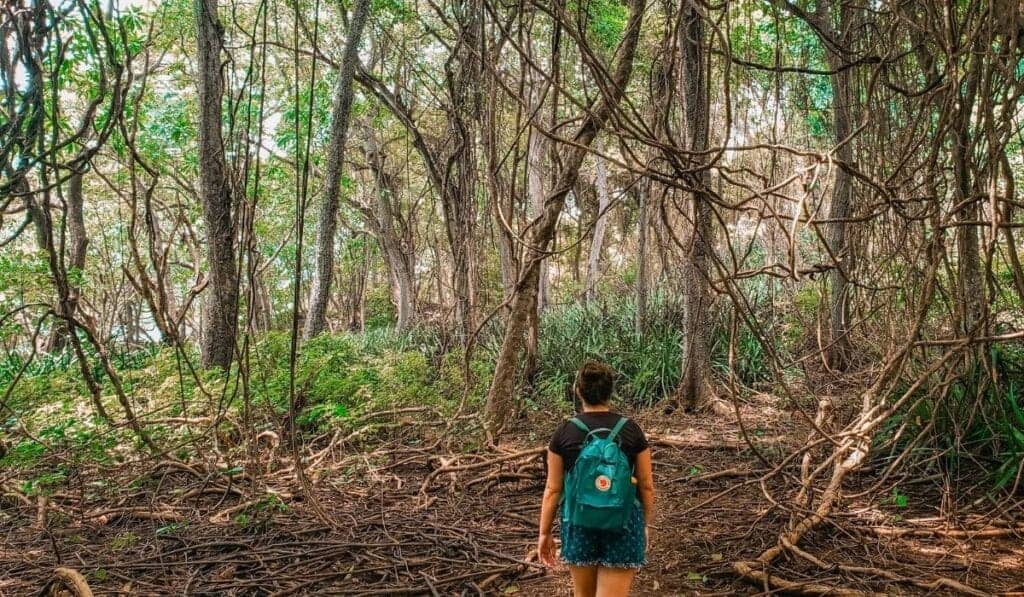Disclaimer: This article may contain affiliate links. Clicking on them may earn Costa Rica Vibes a commission, at no extra cost to you. Thank you for your support!
Mosquitoes in Costa Rica: How to Stay Protected
Should you worry about mosquitoes in Costa Rica? The short answer is, maybe.
Mosquitoes in Costa Rica are known to carry a few different illnesses. However, the chances of getting one of these illnesses are still relatively low. We have been living in this country since 2016 and, fortunately, neither of us has ever come down with a mosquito-borne illness.
By taking some of your own precautions you can greatly reduce your chance of contracting a mosquito-borne illness in Costa Rica.
We created this guide to fill you in on all the things you need to be aware of regarding mosquitoes in Costa Rica.
Mosquitoes in Costa Rica at a Glance
- Dengue should be your biggest health concern from mosquitoes in Costa Rica
- Mosquitoes are worse during the rainy season and in lowland areas.
- Don’t forget to purchase travel insurance. It’s helpful if you need medical treatment while in Costa Rica.
- Shop our favorite mosquito protection products
Illnesses from Mosquitos in Costa Rica
There are three main mosquito-borne illnesses you need to think about in Costa Rica. These are Zika, Dengue, and Chikungunya.
Zika Virus
Zika virus is a flavivirus primarily transmitted to humans through the bite of infected Aedes mosquitoes.
Zika can cause birth defects in pregnant women. If you are pregnant or planning to become pregnant within a year it is best to talk to your doctor before planning a visit to Costa Rica.
Symptoms
A lot of people infected with Zika show almost no symptoms. You might not even know you have the illness.
Some mild symptoms you may experience are conjunctivitis, fever, rash, muscle pain, headache or joint pain.
Treatment and Prognosis
There is no set treatment. Drink plenty of fluids and get a lot of rest.
Individuals infected with Zika virus are advised to avoid non-steroidal anti-inflammatory drugs (NSAIDs) such as ibuprofen and aspirin until dengue fever is ruled out. This will reduce the risk of bleeding complications.
Dengue Fever
Dengue fever is a viral illness transmitted to humans primarily through the bite of infected Aedes mosquitoes.
Dengue is a huge health concern in Costa Rica and something you should be concerned about.
The virus exists in four distinct serotypes, and infection with one serotype does not provide immunity against the others. This means that you can get Dengue more than once.
Symptoms
Dengue fever typically presents with sudden onset high fever, severe headache, muscle and joint pain, and a characteristic skin rash.
Other common symptoms include nausea, vomiting, and mild bleeding (such as nosebleeds or gum bleeding).
In severe cases, dengue can progress to a potentially life-threatening form known as severe dengue or dengue hemorrhagic fever. This is characterized by severe bleeding, organ impairment, and plasma leakage.
Typically these symptoms will start three to fourteen days after being infected.
If you are experiencing a high fever and any of these symptoms see a doctor immediately.
Also, if you have previously had Dengue it is best to see your doctor before visiting Costa Rica. There is a Dengue vaccine but it is only recommended for people who have previously been infected. If you get infected a second time the symptoms tend to be a lot worse.
Treatment and Prognosis
There is no specific antiviral treatment for dengue fever. Management primarily involves supportive care to relieve symptoms and prevent complications.
This includes rest, hydration, and the use of over-the-counter medications such as acetaminophen to reduce fever and alleviate pain.
Non-steroidal anti-inflammatory drugs (NSAIDs) such as ibuprofen and aspirin should be avoided. They can increase the risk of bleeding.
In severe cases, hospitalization may be necessary for close monitoring and intravenous fluid replacement therapy.
Patients generally recover in 2-7 days.
Chikungunya
Not a fun illness, but fun to say! Try saying Chikungunya three times fast.
Chikungunya is a viral illness transmitted to humans primarily through the bite of infected Aedes mosquitoes.
The word “chikungunya” originates from the Kimakonde language, meaning “to become contorted.” This reflects the joint pain that people experience when infected.
While typically not fatal, chikungunya can cause significant discomfort and impact daily life, making understanding its symptoms and treatment crucial.
This is not a huge concern in Costa Rica at the moment and not super common.
Symptoms
Severe joint pain, often affecting multiple joints and lasting for weeks to months. Other common symptoms include high fever, headache, muscle pain, rash, and fatigue.
Symptoms typically appear 3 to 7 days after being bitten by an infected mosquito and can persist for several weeks.
Treatment and Prognosis
There is no specific antiviral treatment for chikungunya. Management primarily focuses on relieving symptoms.
This includes rest, hydration, and the use of over-the-counter pain relievers such as acetaminophen to alleviate fever and joint pain.
Non-steroidal anti-inflammatory drugs (NSAIDs) may also be prescribed to help reduce inflammation and alleviate pain.
The pain can be debilitating but should pass within a few days to weeks. In certain cases, people experience joint pain for several months.
We have read that once you get once in your life you are unlikely to ever contract it again.
The Worst Places and Times for Mosquitos in Costa Rica

Mosquitos can be found in almost every location in Costa Rica and at every time of year. However, they are definitely some areas in which the problem is worse.
You won’t typically find mosquitos at higher elevations such as in Monteverde or in the Central Valley area (San Jose and Alajuela).
Mosquitos are typically a problem in coastal lowland towns, especially in the early evening. Many coastal towns have rivers or swamp land with standing water. These areas are prime mosquito breeding grounds.
The mosquitos in Costa Rica are particularly a problem on the lower Pacific Coast from Manuel Antonio down to the Osa Peninsula as well as on the Caribbean Coast.
The mosquito problems can be worse during the rainy season when there is a lot more standing water.
During the dry season (December – April) there are far fewer mosquitos.
Our Favorite Mosquito Proofing Products
Insect Repellent: We like to put the least amount of chemicals on our skin as possible, but when it comes to the mosquitos here we don’t mess around. I use DEET because I really don’t want Dengue.
If you don’t feel comfortable with DEET, there are some great all-natural products on the market as well.
Our favorite items are:
- Repel 100 Insect Repellent: Our favorite bug spray for Costa Rica that is powerful and lasts for a long time. It contains DEET.
- Repel Insect Repellent Mosquito Wipes: If you prefer wipes instead of spray, Repel also makes that. You shouldn’t have any issues bringing these in your carry-on luggage.
- Murphy’s Naturals Mosquito Repellent Balm: This is an all-natural balm with a lemongrass, rosemary, and peppermint scent. It’s not as powerful but I suggest it because you can bring it in your carry-on on the plane.
- Murphy’s Naturals Insect Repellent Spray: The spray version of Murphy’s all-natural repellent.
Keep in mind: You can not bring aerosol cans on a plane. So opt for regular spray bottles. Also, you can always buy bug spray in Costa Rica. It is sold in all major grocery stores. Usually, you will find Off! brand.
If you bring your bug spray with you make sure to put it in a sealed ziplock bag for the flight. Trust me, getting the smell of bug spray out of everything you own is not fun.
Mosquito Nets: In mid-range to high-end hotels you shouldn’t need this. If you are primarily staying at hostels, budget hotels, or very rustic places it is not a bad idea to bring your own mosquito netting (or at least message the hotel to ask if that is something you might need). You can also buy a mosquito netting for your head. It is a bit nerdy, but if it will protect you from illness, then it is definitely worth it.
Mosquito Coils: Mosquito coils are great for burning while you are sitting outside and want to keep the bugs at bay. I am not positive if you can bring these on the plane or if they are considered a flammable object. I would suggest buying them in Costa Rica instead. They only cost a few dollars and you can get them at all grocery stores.
Mosquito Bite Relief: This is not a product that will prevent bug bites, but a bug bite relief stick can be very helpful once you have a bite and need some relief from the itching. This contains antiseptic as well.
Long Pants and Long Sleeves: It is a good idea to wear protective clothing when in buggy areas.
How to Protect Yourself from Mosquitos in Costa Rica

There are several things you can do to protect yourself. Here is what has worked for us so far (fingers crossed it keeps working).
Avoid Buggy Situations
Early evenings and early mornings seem to be the times with the most mosquitos in Costa Rica.
Thomas and I are big fans of early evening dinners outside so we can watch the sunset.
We make sure to put on bug spray before we go out and also bring a bottle with us if we need a little insect repellent refresher while out.
Cover Yourself
If you know you will be in a buggy area, cover your skin. Wear long-sleeved shirts, pants and shoes.
For me, my feet are the mosquito’s favorite food. I always make sure my feet and ankles are completely covered when I’m in a buggy area.
Check the CDC Website
The Centers for Disease Control and Prevention website is your best source on all things illness-related while traveling abroad.
Here you can see current information on which vaccines you need before visiting, which insects to watch out for, and more!
Purchase Travel Insurance
Travel insurance can be a lifesaver (literally) while traveling. If you get ill from a mosquito-transmitted illness you will want to have the option of getting immediate medical care and having medical expenses refunded.
We love Heymomodo for travel insurance.
Use Good Mosquito Proofing Products
The CDC website recommends using DEET, picaridin, oil of lemon eucalyptus, and IR3535 as protection against mosquitos. You can learn all about our favorite products below.
Where Should You Go if You Think You Have a Mosquito-Borne Illness?
Typically you probably won’t realize that you have an illness from a mosquito until you return to your home country because the incubation period is usually at least a few days to two weeks after getting bitten.
If you think you have one of the mosquito-related diseases and need medical attention while in Costa Rica, your first stop should be the front desk of your hotel. They can direct you to a nearby pharmacy, doctor, or hospital. They should also be able to help you find someone who speaks English if you need to.
If things are very severe it is best to get to San Jose to one of the private hospitals. The two best private hospitals in San Jose are CIMA and Clinica Biblica. We have never had to get medical treatment at the hospital here, but I have heard better things about CIMA.
If things get bad, it is always a good idea to contact your embassy in Costa Rica. If you are a United States citizen, you can get the embassy contact details here.
Don’t forget to purchase travel insurance before your trip or make sure you are covered internationally by your health insurance provider.
Our Experience with Mosquitos in Costa Rica

We live in San Jose where there aren’t many mosquitos. However, in the past six months or so the mosquitos have been horrible at our house. We think one of our neighbors must have standing water which is becoming a mosquito breeding ground.
It has gotten to the point where I have to coat myself in bug spray multiple times a day and I’m still getting bitten! Yes, I do smell like a walking citronella candle.
I also think I must be allergic to mosquito bites or I just have extremely sensitive skin. It is not unusual for me to end up with massive welts after getting bit. I find that the Cutter Insect Bite Relief stick helps a bit, but it takes some time.
Neither of us has ever gotten any illnesses from mosquitos (that we know of). However, we do know a few people who have gotten Dengue. It is not a common thing, but it has happened to people we know.
The few people we know of were all fine, but one did end up in the hospital. It’s definitely not a fun illness!
With proper precautions, you can definitely lower your chances of contracting a mosquito-borne illness here, but it is hard to eliminate all risk. At a point, you just have to cross your fingers and hope you will be OK.
Other Things to Note
- Yellow Fever is not a problem in Costa Rica. You also do not need a Yellow Fever vaccine to enter Costa Rica unless you are traveling from a Yellow Fever country.
- West Nile Virus is not a problem in Costa Rica
- Other Central American countries have similar mosquito issues. So, if you are traveling through many countries make sure to continue to take precautions to protect yourself from bites.
- The CDC website says that Malaria is present in the Limon and Alajuela Provinces of Costa Rica. I have not heard of this and have not read about any cases. However, if you are concerned you can always opt to get a Malaria vaccine before traveling to Costa Rica.
Conclusion: Mosquitoes in Costa Rica
In conclusion, your risk of infection from mosquito-borne diseases is low in Costa Rica. However, it is still a good idea to take preventative measures to lower your risk of contracting any diseases.
If you have any questions about mosquitoes in Costa Rica, don’t hesitate to leave them in the comment section below. we are always happy to help you!
You Might Also Like:
Costa Rica Travel Details: What You Need to Know
🚗 Should I rent a car in Costa Rica?
Having a rental car will give you the most flexibility when traveling in Costa Rica. This will also allow you to take fun day trips on your own.
- Save 10% Plus Other Perks with Our Adobe Rental Car Discount
- You might also consider; shared shuttle services or private transfer services
🏄🏽 How can I book things to do?
We find that Viator tends to have the most comprehensive selection of activities with secure booking and good cancellation policies.
🍍 I’m overwhelmed with planning. Can you help?
Of course! I suggest joining our Facebook group for specific questions and head to our Start Here Page to get started planning.
✈️ What is the best way to book a flight?
Usually, we have the best luck finding great prices with Skyscanner. Check for flights to both San Jose Airport (SJO) and Liberia Airport (LIR).
🛏️ What is the best way to book my Costa Rica hotels?
We highly suggest Booking.com for hotel bookings and typically use VRBO for Costa Rica vacation rentals.
🗣️What is the main language in Costa Rica?
The main language in Costa Rica is Spanish. Most people working in tourism speak at least some English.
💰 What is the currency in Costa Rica?
The currency used in Costa Rica is the Costa Rican colón (CRC). However, the US dollar is widely accepted in most tourist areas
📞 What is the best way to stay connected?
An eSIM from Airalo is the easiest way to get 4G data while traveling in Costa Rica.
🌴 Is Costa Rica safe?
Generally, Costa Rica is considered safe for tourists. However, like any travel destination, it’s best to use caution and be aware of your surroundings.
🛂 Do you need a passport to go to Costa Rica?
Yes, Costa Rica is its own country. You will need a passport to visit.

Hi! We’re Thomas (the German) and Sarah (the US-er)
We met in Virginia, moved to Germany, and since 2016 we have lived in sunny Costa Rica.
It was a spontaneous decision to move here, but it was the best decision!
Now we spend our days roaming the country to bring you the very best in Costa Rica travel here on Costa Rica Vibes.
Sarah is the writer. Thomas is the one keeping it all together.
Want the whole crazy story?

Sarah McArthur
Sarah McArthur is the co-founder and main writer of Costa Rica Vibes.
She is originally from the United States but has lived in sunny San Jose, Costa Rica since 2016.
She has traveled all over the country and now considers herself a self-proclaimed Costa Rica travel expert.
Want the whole crazy story?

